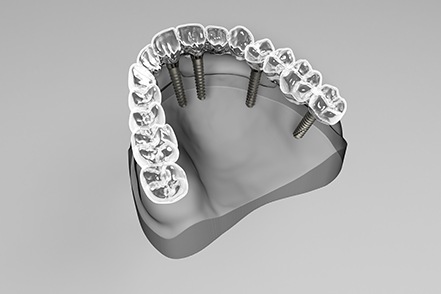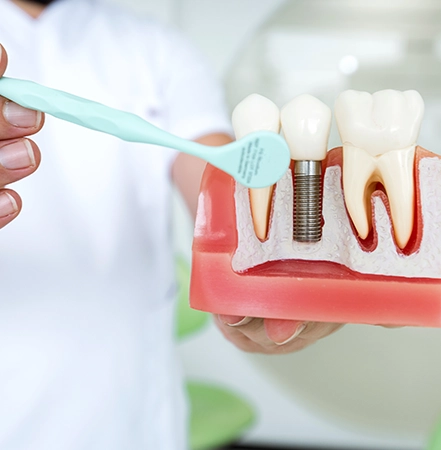The primary teeth begin to erupt around 6 months of age and, by the age of 6 or 7, they begin to fall out to make way for the permanent teeth. By the age of 13, most people have all of their permanent teeth, with the exception of the third molars, or wisdom teeth. In most cases, the wisdom teeth erupt somewhere in the mid-20s.
Permanent teeth should last a lifetime with proper oral care habits and regular dental visits. Unfortunately, for about 50% of the population, this isn’t the case. Tooth loss is one of the most common dental issues and can happen to anyone for a wide variety of reasons. However, the side effects are basically the same: difficulty eating/chewing, difficulty speaking, lowered self-confidence, and more.
Abadin Dental offers several tooth replacement options, including dental implants. This article explains what you need to know about how much dental implants cost.
What are Dental Implants?
Dental implants are a popular tooth replacement solution designed to replace the entire structure of a missing tooth. This option consists of a titanium screw/post that is inserted into the jawbone, acting as a tooth root, and a dental crown, which is attached to the screw/post and sits on top of the gum to replace the visible portion of the tooth. The American Dental Association has named dental implants as the gold standard of tooth replacement.

How Much Do Dental Implants Cost?
Research shows that dental implants can cost as much as $5,000 for a single-tooth implant. However, this depends on several factors, including:
What Impacts Dental Implants Cost?
There are several factors involved in determining dental implants cost, including:
Number of Implants
The cost of dental implants is significantly influenced by the number of teeth that need replacement. Whether a patient requires a single tooth implant, or a full-mouth restoration will directly impact the overall cost. Each additional implant contributes to the total expense, encompassing both the surgical and prosthetic components.
Material Selection
Dental implants are made from different materials, such as titanium and zirconia. Titanium implants are more commonly used due to their durability and compatibility with the human body. Zirconia implants, while aesthetically pleasing, are often more expensive. The choice of material can impact the overall cost of the implant procedure.
Implant Type
Various types of dental implants are available, including endosteal and subperiosteal implants. Endosteal implants are placed directly into the jawbone, whereas subperiosteal implants sit on top of the jawbone, under the gum tissue. The type of implant chosen can affect the complexity of the surgery and, consequently, the cost.
Preparatory Procedures
Before implant surgery, some patients may require additional procedures such as bone grafting or sinus lifts to ensure a stable foundation for the implants. These preparatory procedures contribute to the overall cost of the dental implant process.
Geographic Location
The cost of dental implants can vary based on geographic location and the prevailing economic conditions in a specific area. Urban centers and regions with higher living costs may generally have higher dental implant costs compared to rural areas.
Dentist's Experience and Expertise
The experience and expertise of the oral surgeon or dentist performing the implant procedure can impact the overall cost. Highly skilled and experienced professionals may charge higher fees for their services.
Laboratory Fees
The creation of custom crowns, bridges, or dentures to attach to the implants involves laboratory work. Laboratory fees are a significant component of dental implants cost, as the quality and precision of these prosthetic components are crucial for long-term success.

How to Manage Dental Implants Cost
There are several ways that you can manage your dental implants cost, including:
Dental Insurance
Most dental insurance providers understand the importance of your teeth in your oral and overall health. Therefore, most will offer some coverage on tooth replacement options. Our friendly office staff will work with your provider to determine your coverage. You will be provided with a quote for your portion of the fee during your consultation visit.
HSA/FSA
If you have a health savings account or a flexible spending account, you can use those funds to pay for medical and dental treatments. These accounts are typically tied to your health insurance or offered as part of your benefits through your employer. They take pre-tax dollars and add them to the account to offset your medical expenses. These can be used to cover the cost of your dental implants.
Financing Options
If you do not have adequate dental insurance and are unable to afford treatment out-of-pocket, we offer financing through CareCredit and LendingPoint. Our office staff can explain the eligibility requirements and help patients apply for these programs. These allow you to pay for the treatment upfront and break it up over several months.
Do You Need Tooth Replacement?
If you are missing one or more teeth, it’s important that you seek treatment right away to avoid the potential issues. The gold standard in tooth replacement is dental implants- which is why they are also one of the most expensive options. However, at Abadin Dental, we work with our patients to create a treatment plan that not only meets your needs but also fits within your budget.


